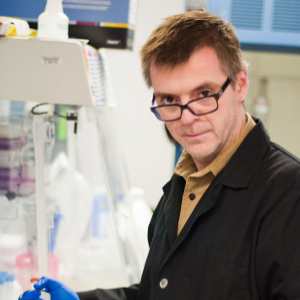
Michael Paul Murphy, PhD
Connect
859-257-1412 ext 490mpmurp3@email.uky.edu
Positions
- Professor, Department of Molecular & Cellular Biochemistry
College Unit(s)
Other Affiliation(s)
- KYAD-PREP
Biography and Education
Education
B.Sc.: University of Toronto, Toronto, Ontario, Canada 1986-91 (Biochemistry)
M.A.: University of Toronto, Toronto, Ontario, Canada 1991-93 (Psychology)
Ph.D.: University of Toronto, Toronto, Ontario, Canada 1993-97 (Neuroscience)
Post-Doctoral: Mayo Clinic, Jacksonville, Florida, U.S.A. 1997-2001
Research
Age-related disease is a major public health problem. As global population demographics shifts towards a relatively older population, these diseases will become a catastrophic burden on both health care resources and on human well being. Our lab is interested in Alzheimer’s disease, and in the molecular pathways that it shares with other disorders. For example, the amyloid precursor protein (APP) is potentially involved in a variety of cellular processes, but is best known for its role as the source of a small peptide fragment known as the amyloid ß peptide (Aß). This peptide plays a major role in the development of Alzheimer’s disease in the brain. Aß and APP may also be involved in the pathology of another age-related human degenerative disease – inclusion body myositis – in muscle. Recently, we have also begun to explore the connections between these processes and metabolic factors involved in type II diabetes, a condition known to confer significant risk for a variety of age-related conditions, including Alzheimer’s disease. We believe that these seemingly disparate diseases are connected not only at the level of shared molecular pathways, but are also connected at the level of transcriptional and translational regulation; our work is centered around understanding these factors. Our ultimate aim is to use the knowledge gained from these studies to refine model systems in which to develop novel therapeutic approaches. Recent studies include the use of NSAIDS (such as ibuprofen), immunotherapy, cholesterol lowering agents, and dietary modifications to modify the processes that we study, and that will hopefully one day lead to effective clinical treatments.